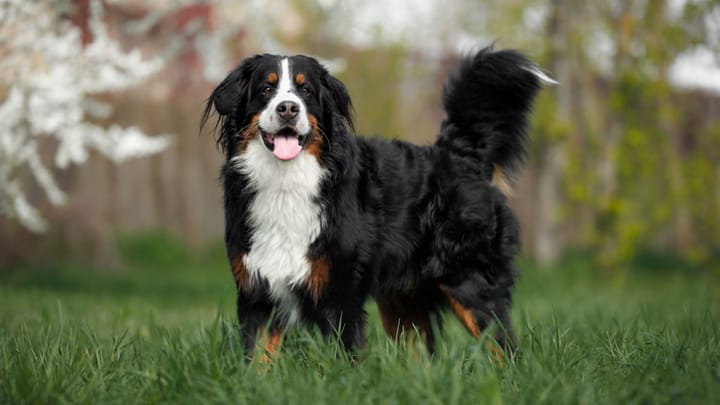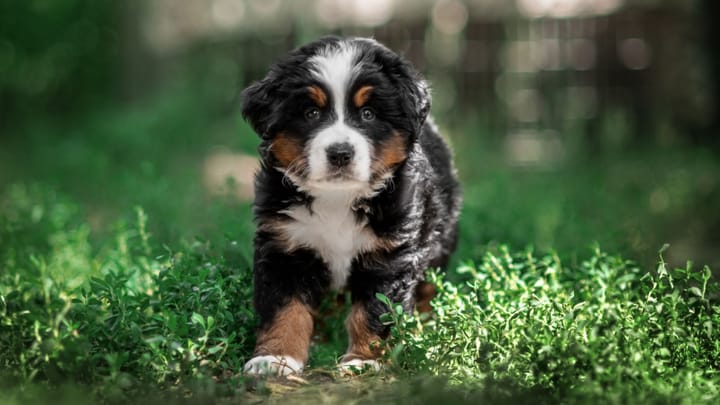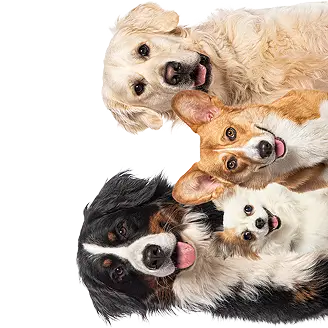Bernese Mountain Dog
Other names : Berne's cowboy, Dürrbächler, Berner Sennenhund


The Bernese Mountain Dog, of Swiss origin, is a large dog with a spectacular appearance. As gentle as he is powerful, he is a teddy-bear dog that will delight the young and old in everyday life. This is a good guard dog who is very suited for a rural way of life, with moderate exercise needs which must be met daily.
|
Life expectancy |
The Bernese Mountain Dog has a life expectancy of between 8 and 10 years |
|
Temperament |
|
|
Size |
Large
|
|
Adult size |
Female
Between 23 and 26 in
Male
Between 25 and 28 in
|
|
Adult weight |
Female
Between 88 and 99 lb
Male
Between 110 and 132 lb
|
|
Coat colour
The Bernese’s coat is tricolour with:
|
Black White Brown |
|
Type of coat
The fur is long. The coat is shiny, smooth or wavy. |
Long Wavy |
|
Eye colour
The eyes are dark brown. |
Brown
|
|
Purchase price |
The Bernese Mountain Dog costs between £1080 and £1100 |
Michael D. Higgins, the President of Ireland, is the proud owner of two Bernese Mountain Dogs: Bród and Síoda. He loves them so much that he brings them along when he attends official events!
More details about the Bernese Mountain Dog
Bernese Mountain Dog: Origins and history
This dog of Swiss origin (near Bern hence his name) comes, like all dogs of the molosser category, from the Tibetan Mastiffs adopted by ancient Rome before spreading through Europe following the Roman legions. From this dog followed the Grosser Schweizer Sennenhund, the Appenzeller Sennenhund, the Entlebucher Sennenhund and of course, the Berner Sennenhund. The different types vary according to their geographical region.
Originally, the Bernese was used for his guarding and herding qualities; now he is mainly considered a family dog, although he is still occasionally employed in mountain rescue scenarios.
Physical characteristics of the Bernese Mountain Dog
The Bernese is a large and well-balanced working dog. His remarkable appearance is very harmonious and his body is powerful, flexible and well-proportioned.
FCI classification of the Bernese Mountain Dog
-
Group 2 - Pinscher and Schnauzer - Molossoid and Swiss Mountain and Cattledogs
-
Section 3 : Swiss Mountain and Cattledogs
Bernese Mountain Dog: Characteristics
Bernese Mountain Dog: Behaviour
Training a Bernese Mountain Dog
Like many sheepdogs, this Swiss Mountain dog has a great ability to concentrate and listen to his master.
However, he matures very slowly (it usually takes 2 to 3 years longer than other dog breeds for the Bernese to reach maturity), so it is necessary to be patient and to repeat training exercises many times so that he can completely acquire them.
Education needs to start early in this dog breed, especially given its large size: up to 60 kg in males!
Therefore, it will be essential to offer the Bernese Mountain Dog puppy a firm but gentle education based on positive reinforcement training and on the dog's personal learning rhythm.
Teaching him to walk on a lead without pulling should be one of the earliest lessons to work on in order to enjoy safe walks.
Bernese Mountain Dog: Lifestyle
Breed compatibility Bernese Mountain Dog
Bernese Mountain Dog: Purchase price
On average, it takes £1100 to buy a Bernese Mountain Dog puppy registered with the Kennel Club. The price will vary depending on the dog's origins, age and gender.
In terms of monthly budget, you need around £70 to provide good quality food and all the necessary care to keep this great Swiss mountain dog healthy.
Bernese Mountain Dog: Shedding
Heavy !
The Bernese Mountain Dog’s shedding is quite impressive, especially during the two periods of biannual shedding: in the fall and spring.
Bernese Mountain Dog: Grooming
Despite his long and thick coat, weekly brushing will be enough to keep his coat healthy.
Further attention is needed to take care of his ears, which may suffer from infections due to their loose shape.
Bernese Mountain Dog: Health
The lifespan of the Bernese Mountain Dog is between 8 to 10 years.
The Bernese Mountain Dog is a rustic dog. Although robust enough by nature, he is affected by several diseases. And, like many large dogs, he will be predisposed to certain physical problems, especially if his masters are not careful about his growth and his morphology when he is performing certain physical activities (e.g. pulling, agility).
The heat will not be a problem as long as the Bernese has access to continuous fresh water and a spot in the shade to rest.
His thick coat and his great courage make this dog very resistant to bad and sometimes extreme weather conditions.
The Bernese Mountain Dog is very greedy and if he does not get enough exercise, he could quickly gain weight.
Therefore, it is important to give him daily rations adapted to his physical condition. Avoid giving him food between meals but make sure to meet his need for energy expenditure.
- Hip dysplasia
- Gastric dilatation-volvulus syndrome (GDV)
- Otitis
- Ectropion
- Histiocytosis: cancer that affects about 20% of this dog breed
Do you want a Bernese Mountain Dog dog ?
Frequently asked questions
Why do Bernese Mountain Dogs have a short lifespan?
Bernese Mountain Dog puppies grow very fast, and so, like many giant breeds, can suffer from issues relating to their joints and bones, which can affect their mobility. However, the main reason for their short lifespan is their predisposition to cancer, particularly Malignant histiocytosis (MH), which affects the organs and is always fatal.
Learn how to spot the signs that your dog is dying of cancer.
Why do Bernese Mountain Dogs drool?
Not all Berners drool systematically, but some will drool more than others. This mainly has to do with the shape of their jowls. The looser their lips, the more likely drool is to drop out of their mouths when they salivate. If you've got a drooler at home, you may want to keep a drool rag handy.
Find out everything you need to know about drooling in dogs.
Are Bernese Mountain Dogs high maintenance?
Overall, yes, this is a high-maintenance breed. They need company to be happy, which means you'll need to spend a lot of time with them. They shed a lot and need regular grooming to avoid matting. They're also large, meaning they need space and proper training so handling isn't a problem. Finally, their poor health also means you could be spending a lot of money at the vet's. But for the right family, they are wonderful, affectionate dogs!
Take our breed test to find out which breed is right for you!






